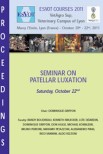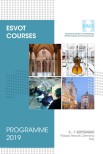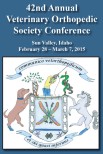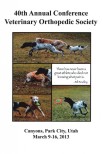Objectives: The aim of this case series was to report arthroscopic findings and to evaluate clinical outcomes of dogs treated with an inverted V-shaped extracapsular stabilisation technique without additional external coaptation for medial shoulder instability.
Material and methods: Medical records of dogs with medial shoulder instability that underwent arthroscopy and an inverted V-shaped extracapsular stabilisation technique were retrospectively reviewed. Extracapsular stabilisation was performed in all dogs using screws and spiked washers as anchor points for the coated polyester prosthetic ligament. No additional external coaptation was used in any dog. A minimum 18-month follow-up period was required for study inclusion. Complications and long-term outcomes were recorded.
Results: The subscapularis tendon and medial glenohumeral ligament were the structures most commonly affected. All dogs had pathological cartilage fibrillations. Implants were successfully placed in all dogs. Implant loosening was recorded in two out of six dogs on recheck but no revision surgery was performed. Function at the time of last clinical follow-up (median, 28 months, range 18 to 33 months) was full in four out of six and acceptable in two out of six dogs.
Clinical significance: Surgical treatment of medial shoulder instability using the novel inverted V-shaped extracapsular stabilisation technique was successful. Potential complications such as implant loosening may occur. Despite the limited number of cases, the present study suggests that additional postoperative external coaptation may not be necessary for successful management of dogs with medial shoulder instability.









